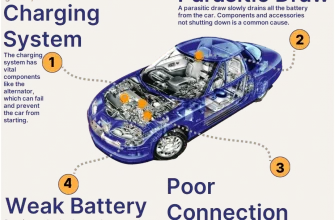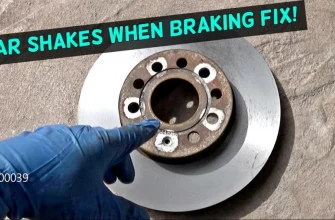When your vehicle’s check engine light illuminates‚ it often leads to a deep dive into diagnostic mysteries. One common culprit behind this alert is the CAM (camshaft) sensor. Understanding the cost associated with replacing a CAM sensor can save you from unexpected expenses and prepare you for necessary repairs. In this article‚ we’ll break down the elements affecting CAM sensor replacement costs‚ the typical price range‚ and what to expect during the repair process.
- What is a CAM Sensor?
- Signs of a Failing CAM Sensor
- Factors Influencing Replacement Costs
- Typical CAM Sensor Replacement Cost
- DIY vs. Professional Replacement
- The Importance of Diagnosing the Right Issue
- Types of CAM Sensors and Their Costs
- Labor Costs: A Hidden Variable
- Warranty Considerations
- Aftermarket vs. OEM Parts: Weighing Your Options
- Long-Term Maintenance: Preventing Future Issues
- Factors Influencing CAM Sensor Replacement Costs
- Understanding Labor Costs
- DIY Replacement: Is It Worth It?
- Maintaining Your CAM Sensor
What is a CAM Sensor?
The CAM sensor plays a crucial role in your vehicle’s engine management system. It monitors the position of the camshaft‚ which is essential for timing the opening and closing of the engine’s valves. The information gathered by the CAM sensor is transmitted to the engine control unit (ECU)‚ allowing it to optimize fuel injection and ignition timing. A malfunctioning CAM sensor can lead to poor engine performance‚ decreased fuel efficiency‚ and increased emissions.
Signs of a Failing CAM Sensor
- Check Engine Light: The most common indicator.
- Engine Performance Issues: Stalling‚ misfiring‚ or rough idling.
- Poor Fuel Economy: Increased consumption can signal a problem.
- Difficulty Starting: The engine may struggle to start or not start at all.
Factors Influencing Replacement Costs
The cost of replacing a CAM sensor can vary widely based on several factors:
- Vehicle Make and Model: Luxury or high-performance vehicles often have higher parts and labor costs.
- Location: Prices can differ based on geographical location; urban areas may have higher labor rates.
- Labor Costs: Hourly rates charged by mechanics can influence total expenses significantly.
- Parts Quality: OEM (Original Equipment Manufacturer) parts typically cost more than aftermarket options.
Typical CAM Sensor Replacement Cost
On average‚ the total cost to replace a CAM sensor ranges from $150 to $400. This estimate generally includes both parts and labor. Here’s a breakdown:
- Parts: $50 to $150 depending on the make and model.
- Labor: $100 to $250‚ usually 1 to 2 hours of work.
For example‚ replacing a CAM sensor in a standard sedan might cost around $200‚ while a luxury vehicle could push the total closer to $400.
DIY vs. Professional Replacement
If you have mechanical skills‚ replacing the CAM sensor yourself can save you labor costs. However‚ ensure you have access to the right tools and follow a reliable repair manual specific to your vehicle. If you’re unsure‚ it’s always wise to consult with a professional mechanic to avoid complications.
Replacing a CAM sensor is a necessary maintenance task that can prevent further engine issues and ensure your vehicle runs smoothly. By understanding the factors influencing replacement costs and recognizing the signs of a failing sensor‚ you can make informed decisions about your car’s health. Whether you opt for a DIY approach or choose to visit a garage‚ being prepared can save you both time and money in the long run.
Remember‚ consistent vehicle maintenance is key to longevity and performance. Don’t ignore warning signs‚ and address issues promptly to keep your car running at its best!
While we’ve covered the fundamental aspects of CAM sensor replacement costs‚ let’s dive deeper into what influences these expenses and how to navigate the world of automotive repairs with confidence. Knowing the ins and outs can empower you to make informed decisions that could save you time and money.
The Importance of Diagnosing the Right Issue
Before committing to a CAM sensor replacement‚ it’s essential to ensure that the sensor is indeed the root of the problem. Mechanics often rely on diagnostic tools to pinpoint issues accurately. A thorough diagnostic check might cost anywhere from $100 to $200‚ but it can save you from unnecessary repairs. Investing in a proper diagnosis can also reveal whether the issue lies in wiring‚ the ECU‚ or other components that might be affecting your CAM sensor’s performance.
Types of CAM Sensors and Their Costs
Not all CAM sensors are created equal. Depending on your vehicle’s design‚ you might encounter different types‚ including magnetic‚ Hall effect‚ or optical sensors. Each type has its own cost structure:
- Magnetic Sensors: Typically more affordable‚ ranging from $50 to $100.
- Hall Effect Sensors: Generally priced between $70 and $150‚ these are common in modern vehicles.
- Optical Sensors: Often found in high-performance engines‚ these can cost upwards of $150.
Labor Costs: A Hidden Variable
Labor rates vary significantly across regions and repair shops. Independent mechanics may charge less than dealerships‚ but the trade-off could be in the level of expertise. It’s worthwhile to compare local repair shops‚ read reviews‚ and ask for quotes. Remember‚ while it may be tempting to go for the lowest price‚ consider the mechanic’s reputation and experience. A more experienced technician might diagnose the problem quicker‚ potentially saving you money in the long run.
Warranty Considerations
If your vehicle is still under warranty‚ check with your dealership. Replacing a CAM sensor might be covered‚ saving you from any out-of-pocket expenses. Even if the vehicle is out of warranty‚ some aftermarket parts come with their own guarantees. Always inquire about warranty options when purchasing a replacement sensor.
Aftermarket vs. OEM Parts: Weighing Your Options
Choosing between Original Equipment Manufacturer (OEM) parts and aftermarket options can significantly affect your budget. OEM parts are typically pricier but are designed specifically for your vehicle. Aftermarket parts are often cheaper‚ but quality can vary widely. Researching reputable brands and reading customer reviews can guide you in selecting the best option for your needs.
Long-Term Maintenance: Preventing Future Issues
Once your CAM sensor is replaced‚ consider implementing a regular maintenance schedule to prevent future issues. Routine checks on engine performance‚ fluid levels‚ and timely oil changes can enhance your vehicle’s lifespan and efficiency. Additionally‚ staying ahead of any warning signs can help you address potential problems before they escalate‚ ultimately saving you money on repairs.
Understanding the nuances of CAM sensor replacement costs can empower you as a vehicle owner. By recognizing the importance of accurate diagnostics‚ the types of sensors available‚ and the factors influencing labor costs‚ you can navigate repairs with greater confidence. Whether you choose to tackle the repair yourself or enlist the help of a professional‚ being informed will help you make the best decisions for your vehicle’s health and your wallet;
In the end‚ a well-maintained vehicle is not just about cost savings; it’s about ensuring safety and reliability on the road. So‚ the next time your check engine light flickers‚ you’ll be ready to tackle the challenge head-on!
When it comes to automotive maintenance‚ few components are as crucial as the CAM (camshaft) sensor; This small but mighty device plays a pivotal role in ensuring your engine runs smoothly; however‚ when it fails‚ you might find yourself facing a costly replacement. Understanding the intricacies of CAM sensor replacement‚ including the costs involved and factors at play‚ can empower you as a vehicle owner to make informed decisions. Let’s take a closer look.
Factors Influencing CAM Sensor Replacement Costs
Several elements can impact the overall cost of replacing a CAM sensor:
- Vehicle Specifications: The make‚ model‚ and year of your vehicle can dramatically affect the price. For instance‚ high-performance sports cars often have specialized parts that can be pricier than standard models.
- Type of Sensor: As discussed previously‚ different CAM sensors have varying price points. The complexity of the sensor’s design also plays a role in labor costs.
- Geographical Location: Labor rates can differ significantly from one region to another. Urban areas typically have higher labor costs compared to rural regions.
- Diagnostic Fees: Before replacing the CAM sensor‚ a mechanic may perform diagnostic tests to confirm the issue‚ which could add to your total expenses.
- Warranty Considerations: If your vehicle is under warranty‚ the replacement might be partially or fully covered‚ reducing your out-of-pocket expenses.
Understanding Labor Costs
Labor is often the most significant component of repair costs. Mechanics typically charge by the hour‚ and depending on their expertise and the complexity of the job‚ rates can vary. Here’s a ballpark idea:
- Independent Mechanics: $75 ⎯ $150 per hour
- Dealerships: $100 ー $200 per hour
It’s also worth noting that some repairs may require additional hours if the mechanic encounters unforeseen complications‚ which could lead to a higher final bill.
DIY Replacement: Is It Worth It?
For those with a penchant for DIY projects‚ replacing a CAM sensor can be an appealing option. However‚ it’s essential to weigh the pros and cons:
- Pros: Cost savings on labor and the satisfaction of completing a task on your own.
- Cons: Risk of misdiagnosing the issue‚ potential for mistakes that could lead to further damage‚ and the need for specific tools.
If you choose to go the DIY route‚ ensure you have access to a reliable repair manual specific to your vehicle model‚ and consider watching tutorial videos to guide you through the process.
Maintaining Your CAM Sensor
Once you’ve replaced your CAM sensor‚ maintaining your vehicle can help extend its lifespan and improve performance:
- Regular Inspections: Check your engine’s performance and watch for any warning lights on your dashboard.
- Routine Maintenance: Keep up with oil changes and other scheduled maintenance to prevent future issues.
- Quality Parts: Whether replacing other sensors or components‚ choose high-quality parts to ensure compatibility and durability.
Understanding the costs associated with CAM sensor replacement is crucial for any vehicle owner. By considering the various factors that influence price‚ the potential for DIY repairs‚ and the importance of maintaining your vehicle‚ you can navigate the complexities of automotive repairs with confidence. Whether you decide to tackle the job yourself or enlist the help of a professional‚ staying informed will help you ensure that your engine remains in prime condition for years to come.
So the next time that check engine light illuminates your dashboard‚ you’ll be ready to face the challenge head-on‚ armed with knowledge and insight!










The signs of a failing CAM sensor were spot on! I had been experiencing some issues, and this article made me realize what to look for.
This article is a must-read for car owners. Understanding your vehicle
This article provided a clear explanation of the CAM sensor and its importance. It really helped me understand why my check engine light was on!
Thanks for breaking down such a complex topic into easy-to-understand sections. I feel more knowledgeable about my car now!
I appreciated the breakdown of replacement costs. Knowing what factors influence the price helps in budgeting for repairs.
I found the typical cost range for replacement very helpful. It’s good to have an idea before heading to the mechanic.
Great information! The explanation about the role of the CAM sensor in engine management was very informative.
I love how this article covers both technical details and practical advice on repairs. Very well done!